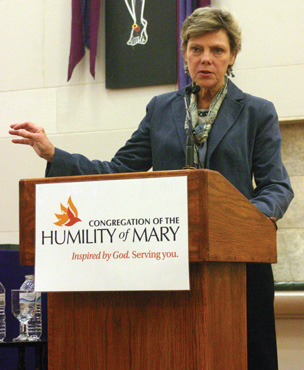By Celine Klosterman

DAVENPORT — The ethics and successes of religious women have deeply impacted U.S. society, Cokie Roberts told about 350 people at St. Ambrose University March 28.
Sisters have started schools, orphanages and hospitals and advocated for minorities’ rights, sometimes despite opposition from civil and Church authorities, the Emmy-winning journalist and author said. Roberts’ presentation, “Nuns in American History: Women of Conscience and Courage,” delivered in Christ the King Chapel, helped the Congregation of the Humility of Mary celebrate its 150th year in the United States. Her visit to the Quad Cities was sponsored by WVIK-FM in Rock Island, Ill., and the Sisters of Humility.
Early in her talk, Roberts recalled covering the 2013 papal election as a journalist and noticing the humble tone Pope Francis struck as he greeted a crowd in St. Peter’s Square. “We can clearly say he learned that from the nuns,” she said, to laughter and applause.
She noted the courage 10 nuns showed 150 years ago in leaving their families and an oppressive government in France to come to the United States. Those women, the first Sisters of Humility in America, settled in Ohio and Pennsylvania and began caring for children orphaned during the Civil War. As the religious community grew, Sisters started colleges, schools, hospitals and orphanages.
In the 1960s, the congregation realized it had abandoned its original mission of serving the poor, Roberts said. So the Sisters shifted focus and, today, minister to people who are homeless, hungry, imprisoned, undocumented or otherwise marginalized.
“Nuns have always been great agents of change,” Roberts said. St. Elizabeth Ann Seton, founder of the Sisters of Charity, established the first Catholic school in the United States in the early 19th century, when women had few legal or political rights. St. Katharine Drexel, founder of the Sisters of the Blessed Sacrament, battled violent opposition to educate black students in the early 20th century. She established Xavier University of Louisiana, the only black, Catholic college in the country.
More recently, NETWORK, a Catholic social justice lobby, sponsored “Nuns on the Bus” cross-country tours to advocate for legislation supporting poor people and immigrants. Today’s Sisters also fight to end human trafficking and protect the environment, “year in and year out,” Roberts said.
There may be fewer consecrated women than in years past, “but the number of women acting on their faith to serve society is higher than ever.” People must continue to emulate Sisters’ examples, even if it sometimes makes them uncomfortable, Roberts said.
Many young people today have no contact with nuns, so what media can the young generation access to get exposed to Sisters? a woman asked following Roberts’ talk. The presenter suggested the documentary “Women & Spirit: Catholic Sisters in America.” She also encouraged visiting the Sisters of Humility website, www.chmiowa.org, for resources.
Other attendees’ questions addressed women’s influence in the Church, politics and the workplace. Roberts noted Pope Francis recently appointed four lay women to the new Pontifical Commission for the Protection of Minors.
As legislators, women are more inclined than men to work on issues affecting families and children, and tend to be more collaborative and pragmatic, she said later.
But many workplaces need to be more “caretaker friendly,” as most people caring for senior citizens and children are women, Roberts said.
She offered a message relevant to a variety of people — lay and religious, young and old, Sarah Eikleberry said after the speaker’s presentation. “Her talk reinforced to me that my voice matters,” said the assistant professor of kinesiology at St. Ambrose. “When there are more women in the room and more voices represented, discussions tend to be more civil.”
Young women today need to take the initiative to offer leadership, Eikleberry said. They can’t take for granted the gains women made in previous decades.
“I am so concerned for the younger women who are one or two generations removed from this outstanding generation of mothers and grandmothers,” Jane Moberg Ladwig said while standing amid the crowd gathered for Roberts’ talk. A former Maryknoll Sister, she encouraged women to avoid complacency and pursue leadership positions in their communities.
“I appreciated Cokie’s affirmation of the Sisters’ work with persons who are often forgotten,” said Sister Johanna Rickl, CHM president. “It was encouraging to hear how she has maintained connections with ‘her’ Sisters and has continued to find meaning in living out the values they instilled,” Sr. Rickl added, referring to the Religious of the Sacred Heart who educated Roberts. “I am glad she challenged everyone to carry on the legacy of the Sisters. This can be done by being an expression of God’s love and by persistent and faithful commitment to Gospel values, especially by strengthening the community through actions grounded in justice and love.”







